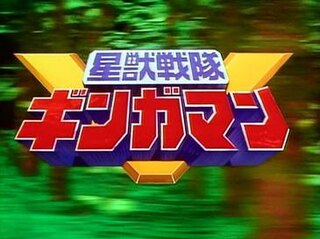Naga or NAGA may refer to:

Tokusatsu is a Japanese term for live-action films or television programs that make heavy use of practical special effects. Credited to special effects director Eiji Tsuburaya, tokusatsu mainly refers to science fiction, war, fantasy, or horror media featuring such technology but is also occasionally dubbed a genre itself. Its contemporary use originated in the Japanese mass media around 1958 to explain special effects in an easy-to-understand manner and was popularized during the "first monster boom" (1966–1968). Prior to the monster boom, it was known in Japan as tokushu gijutsu or shortened tokugi.
Doctor or The Doctor may refer to:
Avatar is a concept in Hinduism representing a material manifestation of a deity.
The Metal Hero Series is a metaseries of tokusatsu superhero TV series produced by Toei for Japanese television.
The Crusades were a series of religious wars sanctioned by the Latin Church in the medieval period. Crusading movement is about the ideology and institutions associated with crusading.

Seijuu Sentai Gingaman is a Japanese tokusatsu television series. It is Toei's 22nd entry of the Super Sentai metaseries. The series aired from February 22, 1998, to February 14, 1999, replacing Denji Sentai Megaranger, and was replaced by Kyuukyuu Sentai GoGoFive. The lead screenwriter for the series is Yasuko Kobayashi. Toei given the name for international distribution is Gingaman.

Kyōryū Sentai Zyuranger is a Japanese tokusatsu television series and the sixteenth installment in the long-running Super Sentai metaseries of superhero programs. Produced by Toei and Bandai, it aired on TV Asahi from February 21, 1992 to February 12, 1993, with a total of 50 episodes replacing Chōjin Sentai Jetman and was replaced by Gosei Sentai Dairanger. It was the first Sentai series to have a regular Sixth Ranger, and the first to introduce the concept of sentient, living mecha, a theme that has been used frequently in the franchise ever since. The title Toei gives this series for international distribution is Galaxy Rangers.

Koichi Sakamoto is a Japanese film and television director, stunt performer and coordinator, fight choreographer and producer. He is best known for his work in the tokusatsu genre, particularly for the Power Rangers, Super Sentai and Kamen Rider franchises.
Beast most often refers to:
A galactic republic is a republic that spans most of a galaxy. It may refer to:

Kaizoku Sentai Gokaiger is a Japanese Tokusatsu television series and the 35th entry in its long-running Super Sentai metaseries of Japanese tokusatsu television series following Tensou Sentai Goseiger. It follows a Pirate motif, joining Kamen Rider OOO and then Kamen Rider Fourze as a program featured in TV Asahi's Super Hero Time programming block. It aired from February 13, 2011 to February 19, 2012, replacing Tensou Sentai Goseiger and was replaced by Tokumei Sentai Go-Busters. The catchphrase for the series is "Let's make it showy!".
Naruhisa Arakawa is a Japanese screenwriter who primarily works on anime and tokusatsu dramas. He first served as a series' main writer for Blue Seed anime and the Kamen Rider Series revival Kamen Rider Kuuga. Arakawa was the main series writer for the Super Sentai anniversary series Kaizoku Sentai Gokaiger where he is also credited as a lyricist for the ending theme song with Shoko Fujibayashi. He also wrote the lyrics to "Detekoi Tobikiri Zenkai Power!", the first ending theme of Dragon Ball Z.

Tokumei Sentai Go-Busters is Japanese tokusatsu television series and the 36th entry in Toei Company's Super Sentai metaseries, following Kaizoku Sentai Gokaiger. Its theme is based on spy movies and cyber technology on February 26, 2012 on TV Asahi, joining Kamen Rider Fourze and then Kamen Rider Wizard as a program featured in TV Asahi's Super Hero Time programming block. It aired from February 26, 2012 to February 10, 2013, replacing Kaizoku Sentai Gokaiger and was replaced by Zyuden Sentai Kyoryuger.

Doubutsu Sentai Zyuohger is a Japanese Tokusatsu drama and the 40th entry of Toei's long-running Super Sentai metaseries, following Shuriken Sentai Ninninger. It aired from February 14, 2016 to February 5, 2017, replacing Shuriken Sentai Ninninger and was replaced by Uchu Sentai Kyuranger. The program joining Kamen Rider Ghost, and later, Kamen Rider Ex-Aid in the Super Hero Time line-up on TV Asahi affiliate stations. Released as part of Super Sentai's 40th anniversary and Toei's "Super Hero Year", Zyuohger is the seventh series in the franchise whose central theme is animals, after Taiyo Sentai Sun Vulcan, Choujyu Sentai Liveman, Chōjin Sentai Jetman, Seijuu Sentai Gingaman, Hyakujuu Sentai Gaoranger, and Juken Sentai Gekiranger. The series also has a Minecraft-inspired and Rubik's cube motif. The lead screenwriter for the series is Junko Kōmura.

Kamen Rider Ex-Aid is a Japanese tokusatsu drama in Toei Company's Kamen Rider Series. It is the eighteenth series in the Heisei period run and the twenty-seventh series overall. Toei registered the Kamen Rider Ex-Aid trademark on June 13, 2016. The show premiered on October 2, 2016, one week after the finale of Kamen Rider Ghost, joining Doubutsu Sentai Zyuohger and later, Uchu Sentai Kyuranger in the Super Hero Time line-up., it's the first series marked the debut of a video game motif.

Uchu Sentai Kyuranger is a Japanese tokusatsu drama and the 41st entry of Toei's long-running Super Sentai metaseries. It aired from February 12, 2017 to February 4, 2018, replacing Doubutsu Sentai Zyuohger and was replaced by Kaitou Sentai Lupinranger VS Keisatsu Sentai Patranger. The program joining Kamen Rider Ex-Aid and later Kamen Rider Build in the Super Hero Time line-up on TV Asahi affiliate stations. Kyuranger is considered the fifth space-themed series whose primary motifs are constellations and Greco-Roman mythology, and it is also the first Super Sentai series to introduce nine regular members in the beginning instead of five or fewer like previous installments. The team later gains three additional members, increasing the number to twelve and becoming the largest team of the franchise so far.
This page is based on this
Wikipedia article Text is available under the
CC BY-SA 4.0 license; additional terms may apply.
Images, videos and audio are available under their respective licenses.








